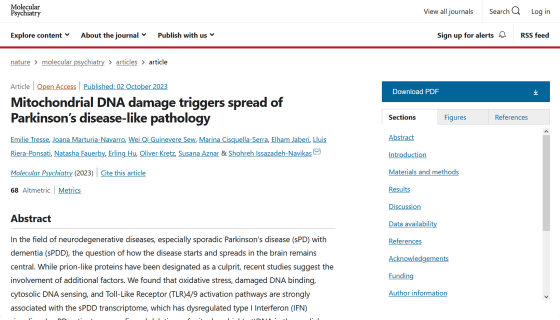Research results show that the cause of Parkinson's disease may be 'damage to mitochondrial DNA'

Mitochondrial DNA damage triggers spread of Parkinson's disease-like pathology | Molecular Psychiatry
https://www.nature.com/articles/s41380-023-02251-4

Researchers find a cause of Parkinson's disease | EurekAlert!
https://www.eurekalert.org/news-releases/1003348
Parkinson's disease is a disease that affects 10 million people worldwide, and this number is expected to continue to increase , but no fundamental cure for Parkinson's disease has been found. Additionally, although multiple disease-causing genes have been identified in familial cases, the cause of onset in the majority of patients is not well understood.
In a new study, a research team led by Professor Shohreh Issazadeh-Navikas , a neuroimmunologist at the University of Copenhagen, analyzed the brains of humans with Alzheimer's disease. As a result, it was found that damage and fragmentation of the mitochondrial DNA in brain cells ( mitochondrial DNA ) may be the cause of Parkinson's disease.
It was also confirmed that when fragments of damaged mitochondrial DNA were injected into the brains of healthy mice, they induced Parkinson's disease-like symptoms such as movement disorders, neuropsychiatric disorders, and cognitive disorders. Furthermore, it has been reported that neurodegeneration was induced in areas far from the site where the mitochondrial DNA fragments were injected, spreading the characteristics of Parkinson's disease like a type of infection.
Issazadeh-Navikas said, 'When mitochondria release damaged DNA fragments into the cell, they become toxic to the cell, and nerve cells try to get rid of this toxic mitochondrial DNA. Brain cells are interconnected. 'As a result, these toxic DNA fragments spread to distant neighboring cells, like an out-of-control wildfire in a bonfire.'

The results of this study are expected to deepen our understanding of Parkinson's disease and be the first step toward developing future treatments. In addition, by detecting damaged mitochondrial DNA fragments from the subject's body, it may be possible to use them as
'Fragments of damaged mitochondrial DNA in brain cells can leak into the bloodstream,' Issazadeh-Navikas said. 'It will be possible to take a small sample of a patient's blood.'
The research team will now investigate whether mitochondrial DNA damage can serve as a predictive marker for the stage and progression of Parkinson's disease. They also reported that they will explore potential treatments to repair the mitochondrial dysfunction that causes Parkinson's disease and restore mitochondrial function.

Related Posts:
in Science, Posted by log1h_ik







